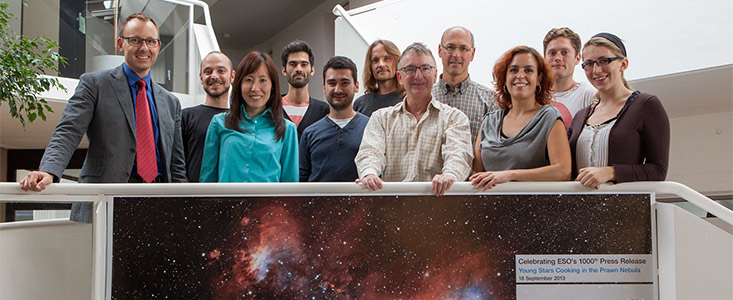Anúncio
O ESO celebra a sua milésima Nota de Imprensa
18 de Setembro de 2013
A nota de imprensa desta semana, uma nova imagem da Nebulosa do Camarão, é um pequeno marco por si só - a nota de imprensa do ESO número 1000. Este número impressionante é um reflexo do estatuto do ESO como a organização de astronomia no solo mais produtiva do mundo, em termos de número de artigos científicos produzidos. Por coincidência, esta semana marca também a publicação do artigo científico número 10 000 do ESO.
O departamento de divulgação do ESO, que se encarrega da comunicação do ESO com o público, foi criado em 1986, durante o excitante período do aparecimento do cometa de Halley em 1985-86, sendo por isso um dos mais antigos departamentos de divulgação astronómica do mundo. Começou de modo um pouco diferente, com o nome de Serviço Fotográfico e de Informação do ESO (IPS, Information and Photographic Service, refletindo as origens de pessoal chave do antigo Laboratório de Atlas Celeste do ESO).
Com a crescente experiência compreendeu-se que a informação destinada ao público deveria ser algo bem gerido, e o departamento mudou o seu nome, primeiro para Departamento de Educação e Relações Públicas do ESO (EPR, Education and Public Relations Department), depois para Departamento de Assuntos Públicos do ESO (PAD, Public Affairs Department) e finalmente para Departamento de Educação e Divulgação do ESO (ePOD, education and Public Outreach Department, tendo-se juntado aos gabinetes de imprensa do IAU e da divulgação do Hubble por parte da ESA). Curiosamente, o departamento foi sempre liderado por dinamarqueses, primeiro pelo perito em cometas Richard West (famoso pelo Cometa West), depois por Claus Madsen e, desde 2008, por Lars Lindberg Christensen. Este é, no entanto, capaz de ser o único ponto comum, já que o campo da comunicação em astronomia sofreu enormes mudanças desde que as primeiras notas de imprensa foram enviadas por correio e depois por telefax.
A primeira nota de imprensa do departamento de divulgação do ESO mostrava uma imagem granulada a preto e branco do Cometa de Halley formando uma cauda, fotografado em 1985 pelo telescópio Schmidt de 1 metro do ESO, em La Silla. Ao longo dos anos outras notas de imprensa mereceram especial destaque, incluindo as que marcaram o encontro explosivo do cometa Shoemaker-Levy 9 com Júpiter em 1994, a primeira luz do VLT em 1998, a aprovação do E-ELT pelo Conselho do ESO em 2012 e a inauguração do ALMA em 2013. Muitos resultados científicos pioneiros têm sido anunciados, incluindo a primeira imagem direta de um exoplaneta, a primeira observação no visível de uma explosão de raios gama de curta duração e o primeiro espectro atmosférico de um exoplaneta.
Links
- Dez resultados científicos principais do ESO
- Artigo número 10 000 baseado em dados do ESO
- Nota de imprensa nº 1: o Cometa de Halley
- Nota de imprensa nº 1000: a Nebulosa do Camarão
Contactos
Richard Hook
Public Information Officer, ESO education and Public Outreach Department
Garching bei München, Germany
Tel: +49 89 3200 6655
Telm: +49 151 1537 3591
Email: rhook@eso.org
Sobre o anúncio
| Id: | ann13077 |

